商务英语综合教程4 Unit1
综合商务英语教程四册1章International Trade Data
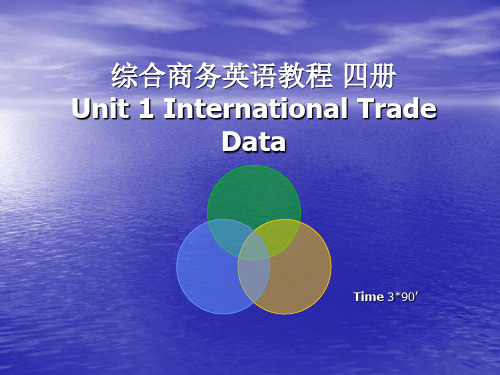
Data
Time 3*90’
Objectives Focus 1.1 Importance of data in foreign trade 1.2 Classifying charts 1.3 Language focus in data expression Sum-up Assignment
• Exercise 2
– Pick out one of your favorite countries in the table and introduce its trade relation with U.S. to your classmate. You may find more materials such as major export or import products, changes in trade positions, trade policies and so on.
Content
1.3. Language focus in data expression
• Words showing the direction of motion helps us
describe the trend of data – rise, climb, move up --– drop, down, dive ---
Content
• Read “top 10
trading partners of the U.S.”
• Exercise 1.
– categorize the 10 countries in the next table
Country
商务英语综合教程第四册Unit 1 Business Organizations
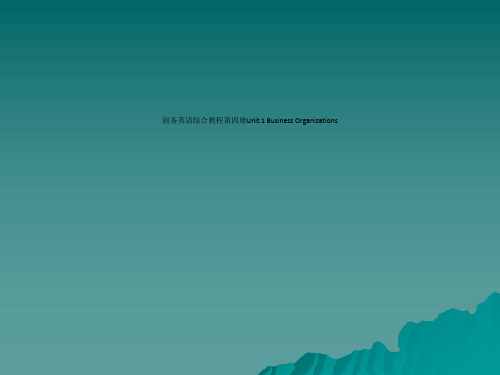
Notes of Text
1. Sole Proprietorship: a type of business entity that is owned and run by one individual and in which there is no legal distinction between the owner and the business 独资(经营) 2. Partnerships: A partnership is an arrangement where parties agree to cooperate to advance their mutual interests. 合伙人企业
must ________ the workers.
8. He ________ his political view on the radio.
9. ________ things you want to keep and throw everything else away.
10. However, its ________ is indefinite.
There are many ways of defining success. It is accurate to say that each of us has our own concept of success to the extent that each of us is responsible for setting our own goals and determining whether we have met these goals satisfactorily. Because each of us possesses unique differences in genetic ability and favorable environments in which to express these abilities, it is necessarily true that we must define success broadly.
商务英语综合教程1-王立非-Unit 4
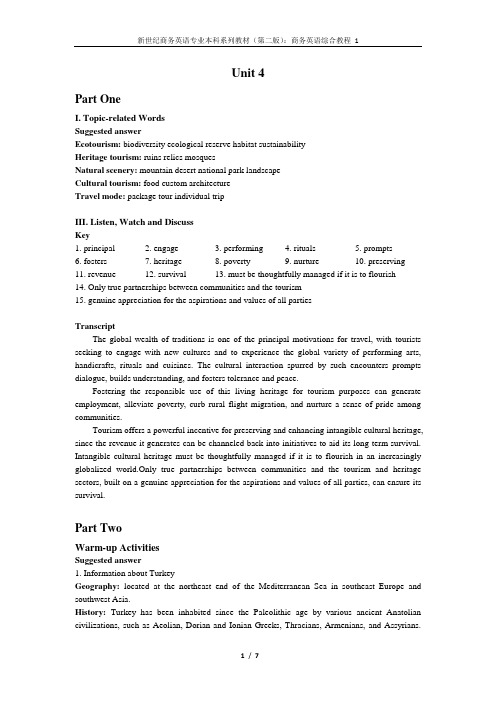
Unit 4Part OneI. Topic-related WordsSuggested answerEcotourism: biodiversity ecological reserve habitat sustainabilityHeritage tourism: ruins relics mosquesNatural scenery: mountain desert national park landscapeCultural tourism: food custom architectureTravel mode: package tour individual tripIII. Listen, Watch and DiscussKey1. principal2. engage3. performing4. rituals5. prompts6. fosters7. heritage8. poverty9. nurture 10. preserving 11. revenue 12. survival 13. must be thoughtfully managed if it is to flourish14. Only true partnerships between communities and the tourism15. genuine appreciation for the aspirations and values of all partiesTranscriptThe global wealth of traditions is one of the principal motivations for travel, with tourists seeking to engage with new cultures and to experience the global variety of performing arts, handicrafts, rituals and cuisines. The cultural interaction spurred by such encounters prompts dialogue, builds understanding, and fosters tolerance and peace.Fostering the responsible use of this living heritage for tourism purposes can generate employment, alleviate poverty, curb rural flight migration, and nurture a sense of pride among communities.Tourism offers a powerful incentive for preserving and enhancing intangible cultural heritage, since the revenue it generates can be channeled back into initiatives to aid its long-term survival. Intangible cultural heritage must be thoughtfully managed if it is to flourish in an increasingly globalized world.Only true partnerships between communities and the tourism and heritage sectors, built on a genuine appreciation for the aspirations and values of all parties, can ensure its survival.Part TwoWarm-up ActivitiesSuggested answer1. Information about TurkeyGeography: located at the northeast end of the Mediterranean Sea in southeast Europe and southwest Asia.History: Turkey has been inhabited since the Paleolithic age by various ancient Anatolian civilizations, such as Aeolian, Dorian and Ionian Greeks, Thracians, Armenians, and Assyrians.The Persian Empire occupied the area in the 6th century B.C., giving way to the Roman Empire, then later the Byzantine Empire. The Ottoman Turks first appeared in the early 13th century, and gradually spread through the Near East and Balkans, capturing Constantinople in 1453. After the reign of Sultan Suleiman I the Magnificent (1494—1566), the Ottoman Empire began to decline. In the nineteenth century, Turkey was occupied by Russia, but the Turkish War of Independence (1919—1922) resulted in the establishment of the modern Republic of Turkey in 1923.Politics: Turkey is a parliamentary representative democracy.Economy: Turkey has the world’s 17th largest GDP by PPP and 18th largest nominal GDP. The country is among the founding members of the OECD and the G-20 major economies. Religion: Islam is the dominant religion of Turkey with 99.8 percent of the population being registered as Muslim.2. Ancient civilizationsRoman civilization began on the Italian Peninsula as early as the 8th century BC and shifted from a monarchy to a republic and then to an empire. As a highly developed civilization, Ancient Roman has contributed a lot to modern government, law, politics, engineering, art, literature, architecture, technology, warfare, religion, language and society.Persian civilization is a series of imperial dynasties centered in Persia (Iran), the first of which was established by Cyrus the Great in 550 BC, with the Persian conquest of Media, Lydia and Babylonia.Byzantine civilization is the continuation of the Roman Empire in the East during Late Antiquity and the Middle Ages, when its capital city was Constantinople (modern-day Istanbul, originally founded as Byzantium). It survived the fragmentation and fall of the Western Roman Empire in the 5th century AD and continued to exist for an additional thousand years until it fell to the Ottoman Turks in 1453. During most of its existence, the empire was the most powerful economic, cultural, and military force in Europe.Modern historians distinguish Byzantium from ancient Rome insofar as it was centered on Constantinople, oriented towards Greek rather than Latin culture, and characterized by Orthodox Christianity.The Ottoman Empire, which is also known as the Turkish Empire or Turkey, was an empire founded in 1299 by Oghuz Turks under Osman I in northwestern Anatolia. With conquests in the Balkans by Murad I between 1362 and 1389, the Ottoman sultanate was transformed into a transcontinental empire and claimant to caliphate. The Ottomans overthrew the Byzantine Empire with the 1453 conquest of Constantinople (present-day Istanbul) by Mehmed the Conqueror.The Neo-Assyrian Empire was an Iron Age Mesopotamian empire, in existence between 911 and 609 BC. Following the reforms of Tiglath-Pileser III in the 8th century BC, Assyria emerged as the most powerful state of the Ancient Near East, eclipsing Babylonia and Egypt. The Neo-Assyrian Empire succeeded the Middle Assyrian period of the Late Bronze Age. During this period, Aramaic was also made an official language of the empire, alongside the Akkadian language.Text IComprehension CheckI. Reading for general ideas1. Fill in the blanks to complete the outline of the text.KeyMain Idea: The threat to an ancient town with a long history and many treasures, and local people’s attitudes towards it.Heading for Part I (Paragraph 1): Arrival in town and encounter with ShepherdsHeading for Part II (Paragraphs 2 to 3): The history of and treasures in HasankeyfHeading for Part III (Paragraphs 4 to 5): The threat posed by development and concerns Heading for Part IV (Paragraphs 6 to 12): Local dwellers’ hospitality and their attitudes towards the Dam ProjectHeading for Part V (Paragraphs 13—15): The nostalgia, and possible way out for the local people in face of change2. Read the text through quickly and answer the following questions.Key1.Hasankeyf is a small town located in the Batman province of southeast Turkey, not far fromthe border with Syria and, further down, Iraq. It is famous for its long history, more than 300 historical monuments and thousands of ancient human-made caves.2.The treasures in Hasankeyf are facing the threat that by the end of 2015, the massive135m-high and 1,820m-wide Ilisu Dam is projected to force many of Hasankeyf’s sites under water, including the Great Palace and the caves.3.The government has plans to create an archaeological park by relocating some of themonuments to higher ground. The ones that cannot be moved will become an underwater diving park.4.No, not for everyone. Even with these plans, many historians, scientists and archaeologists areconcerned that another Troy or Mycenae may remain lost forever since much of the area has yet to be excavated.5.Some of the local dwellers, such as the patriarch and his family, are strongly against it. Theyhave lived here for f ive generations and they are happy here. They don’t want to leave this place.II. Reading for specific informationKey1. F2. F3. F4. T5. F6. TIII. Reading and making interpretationsSuggested answer1.Even though the government has made plans to save the historical monuments, manyhistorians, scientists and archeologists still feel worried because there are many places which have not been dug yet and maybe there are some important ancient relics which have not been found yet underground. If this happens, it means some important relics as ancient as Troy or Mycenae will be lost forever.2.When I was together with the cave-dwellers, I asked permission to milk their sheep, butwithout success, and they laughed at my failure. When their laughter was not so loud, we changed our topic and began to talk about the dam.3.The shepherds’ truck was in very poor condition and I rode in it with the crowd, crossed ariver which was not deep and arrived at the shepherd’s home. We called it cave, but I did not think cave was the proper word for it.4.The cave was two storeys high, very spacious, with beautiful decoration and running water,electricity and even a glass pane window. It was a place I would like to have. The floor in the living room was covered by thick carpets, which was lined with comfortable cushions.5. A lot of things happened here: wars, earthquakes and conquests. Some of them brought gloryto this place and some brought decline. But no matter what happened, these ancient monuments still stand here and the people still live around them. They have lived longer than those historical events.Part ThreeText IIComprehension CheckI. Reading for specific information1. Fill in the blanks to complete the outline of the text.1.Over the last 30 years international tourism to developing countries has increased enormouslyand one in five international flights now goes to a developing country.2.The park systems in most developing countries are failing to invest at anywhere near thenecessary levels to build capacity for managing the growth in park visits. As a result, tourism is now a threat to biodiversity rather than a benefit. The over-crowdedness of international nature tourism destinations will not only lead to a decline in the quality of the visitor experience, but also have a great impact on the fauna and flora in the destinations.3.On one hand, the destinations should focus on developing financial opportunities and boostingrevenues; on the other hand, the revenues must be reinvested appropriately at the specific sites that generate them, at least at a level adequate to prevent loss of natural capital.4.On one hand, the park systems should get more from the tourism income. On the other hand,they can raise the tickets prices.5.It starts a virtuous cycle: protected areas are more clearly perceived as assets for economicdevelopment, and investments are made in improved tourism management, which in turn leads to more visits and less poverty.II. Reading and making interpretationsSuggested answer1.Now there is a huge gap between the current estimate of spending on protected area indeveloping countries and the lowest expenditure needed to provide effective conservation and management of their resources. If there is proper policy to control the development of nature tourism and ecotourism, it could help greatly in reducing the wide gap.2.Judging by appearance, tourism should be good business to developing countries in all aspects,because it can make tourists happy, bring more revenues to the park systems and increase investment in conservation.3.If investment remains inadequate, tourism will probably cease to prosper soon and becomedifficult to develop.4.On one hand, the conservationists need to deal with the environmental threats caused bytourism development; on the other hand, they should also concentrate on developing tourism in order to bring more economical development.5.According to the financial estimate, if investment is increased, there will be greater demand intourism. The Ecuadorian tourism industry has shown that they are ready to support such initiatives after analyzing the financial estimate.Part FourText IIIQuestions for group discussionSuggested answer1.The text is taken from a travel book. It may also appear as a travelogue, part of a traveljournal or in a travel magazine.2.It gives an account of an American’s experience in the UK: his amusement, bitterness,surprise, and confusion.3.For example, the inn keeper and the man walking a dog.4.The tone of the article is humorous with slight satire. For example, the reality that he couldnot find accommodation must be very annoying to him, but he only refers it as “the only mildly dismaying thing”. Before he approached the guesthouse, he imagined a cheery conversation but was rudely refused in the first place, no chance to offer his humble apology at all. When he had nowhere to go and finally decided to sleep on the street, he referred it as “a shelter open to the elements but roofed” and “decided that this was as good as I was going to get.”Part FiveLanguage FocusFill in the blanks with the words above.1. grace 4. civilize 7. gracefully 10. hospitality2. controversy 5. controversial 8. civilized3. sustainability 6. hospitable 9. sustainableII. Idioms, phrasal verbs and fixed expressions1. in 4. of 7. with 10. about2. out 5. in 8. down3. into 6. to 9. offIII. Collocations1. meant/wished2. doing/inflicting/causing3. potential/serious/untold/irreparable/lasting/permanent4. economically/financially/physically; mentally/spiritually5. from6. through7. manage/struggle/are able/are luckyIV. Complete the following sentences with the words and phrases given in the box.1. fetching 5. contribute to 9. trudge(d) 13. bathed in2. grazing 6. mighty 10. crouch 14. sumptuous3. meager 7. status quo 11. harness 15. abundance4. yawning 8. concession 12. weather-beatenComprehensive PracticeI. Translate the following into English, using the words and phrases from the texts. Suggested answer1.As a result of deregulation and the danger to travelers it has brought about, I make up mymind that I will not make that country my travel destination in recent two years.2.We joined the tour-bus crowds in Petra to visit the ancient capital of the Nabateans and foundthat no words could do justice to the beauty and grandeur of the rose-red city of the desert. 3.Judging by the response to the upcoming trailers, this movie is bound to be another success ofthis young and promising director.4.The old man with a weather-beaten face told us: “We’re thrifty. We can live off our interest,save the principal and let the kids go off and have a hoot.”5.She wrote some controversial poems, which brought her instant fame, but the publicity soondied down over time.II. Translate the following into Chinese.Suggested answer不管度假采取何种形式,我们还是乐此不疲。
商务英语综合教程unit1ppt课件
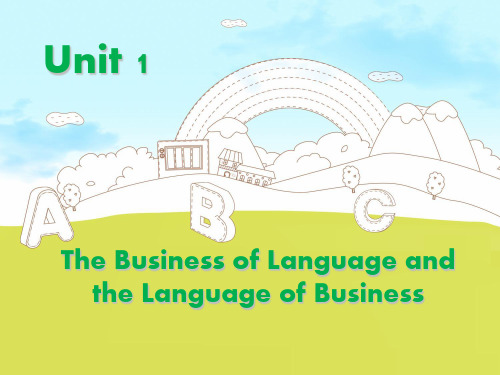
精选ppt
2
Research and discussion
• Julius Caesar • Duke of Normandy • Old English • Latin • French • Middle English • A Table Alphabeticall • Samuel Johnson • Webster • Oxford
2. Reveal the true, objectionable nature of (someone or something)
e.g. He has been exposed as a liar and a traitor.
精选ppt
17
3. If someone is exposed to something dangerous or unpleasant, they are put in a situation in which it might affect them. e.g. Most people in the world are non-smokers and have a right not to be exposed to other people's smoround
Detailed Reading
新标准商务英语综合教程 4 Unit 1 (2)
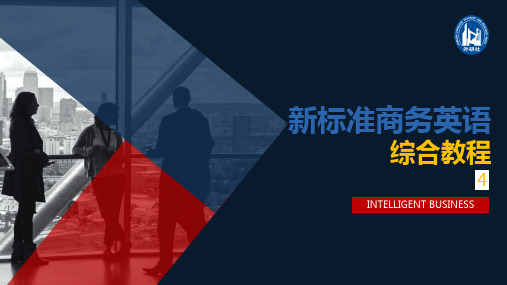
➢ extravagance n. the practice of spending a lot of money, especially more than you should
➢ stringent adj. a stringent law, rule, standard etc. is very strict and must be obeyed ( 法
律、规则、标准等) 严格的
e.g. stringent air quality regulations 严格的空气质量管理条例
Previous page
HOME
Next page
Reading A
Business Knowledge Understanding the text
Language Work
Detailed Study of the
words
➢ complacency n. a feeling of satisfaction with a situation or with what you have achieved, so
e.g. Celebrating a promotion, I took her to a posh hotel for a cocktail. 为庆祝晋升,我带她去一家豪华酒店喝了一杯鸡尾酒。
➢ stiff adj. more severe or difficult than usual 艰难的, 激烈的
Language Work
Detailed Study of the Text
新标准商务英语综合教程 4 Unit 1 (3)
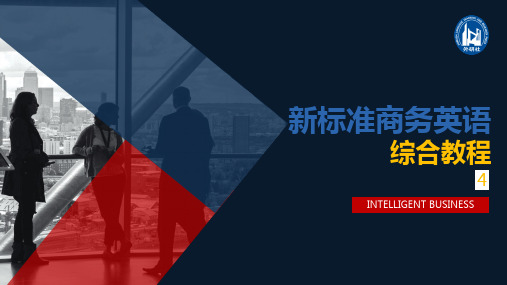
No wonder, then, that the boards of Mitsukoshi and Isetan, the country’s fourth- and fifth-largest department store
chains, laid plans for a merger that would create the country’s biggest retail group, with $14 billion in annual sales. The deal is
Prices of every purchase are added up automatically. When she has finished shopping, the customer hands her card to a cashier who 4 ___ it to the register. A second later the total pops out. Shop lifting is physically impossible.
One man is enough to keep the vending machines filled, because if the stock for a certain commodity is 7 ___ to run out, a red lamp in the computer room 8 ___ him or her. But there are disadvantages too: a customer cannot change his or her mind 9 ___ a purchase. Once 10 ___ , the item cannot be put back. The customer must go through a cashier with it first and get a refund later. There are also no fresh vegetables or fish on sale—everything is prepackaged.
商务英语综合教程Unit 1 Changes in the Motives and Developments
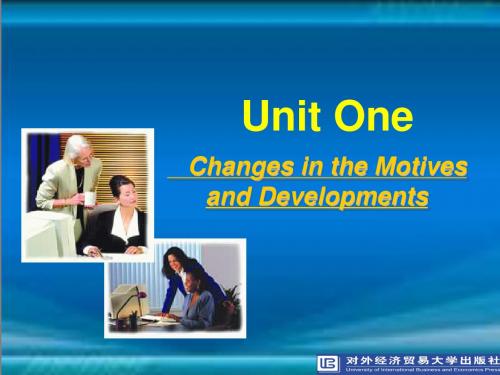
Text
Unit 1 Changes in the Motives and Developments
3 The main motives for foreign direct investment up to the 1980s
were:
1) in industrialized and developed countries to gain access to markets which were virtually impenetrable via exports due to severe protectionism;
Text Exercises
Unit 1 Changes in the Motives and Developments
Related Technical Terms Grammar
Text
Unit 1 Changes in the Motives and Developments
1 A number of important, traditionally closed service sectors, such as financial services and transport, were exposed during the 1980s to foreign competition in increasing numbers of countries and opened up to foreign direct investment. This trend is likely to continue in the 1990s as a result of privatization in transport,
Text
职通商务英语(第三版)综合教程1 Unit 4-1
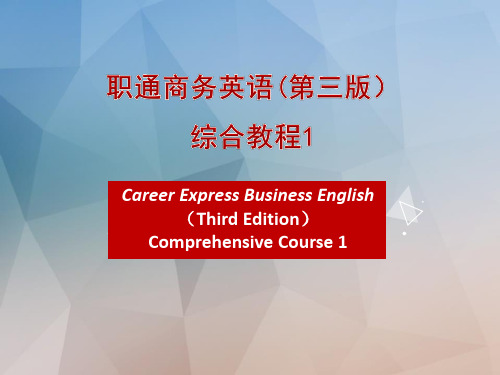
Intensive Reading
What Is Corporate Entertainment?
Corporate entertainment is served as a precision marketing tactic (1). It can be directed at one person or even at several millions. The degree of success achieved mostly depends on the skills, strategies and hard work of the people who engage in it (2).
Indoor Activities
Outdoor Activities
escape room holiday parties award banquets circus entertainment awards dinners karaoke
sea fishing safari sailing rock climbing golfing barbecue
Classify the following types of corporate entertainment into the
correct categories.
escape room/ sea fishing/ holiday parties/ safari/ award banquets/ sailing/ rock climbing/ golfing/ circus entertainment/ barbecue / awards dinners/ karaoke
Warming-up Discussion
- 1、下载文档前请自行甄别文档内容的完整性,平台不提供额外的编辑、内容补充、找答案等附加服务。
- 2、"仅部分预览"的文档,不可在线预览部分如存在完整性等问题,可反馈申请退款(可完整预览的文档不适用该条件!)。
- 3、如文档侵犯您的权益,请联系客服反馈,我们会尽快为您处理(人工客服工作时间:9:00-18:30)。
Oxford:
the main ways that large numbers of people receive information and entertainment, that is television, radio, newspapers and the Internet.
Wikipedia:
magazine newspaper
Published media any media made availabe to the public
Social media media disseminated through social interaction
RenRen, facebook, twitter
Recently a complaint posted on Sina weibo, a popular micro-blogging website in China, about a Sanya seafood restaurant overcharging tourists has triggered controversy among Web users. How does micro-blogging affect the society in terms of the freedom of information? How is it different from the traditional media?
Do you know any other event that has got a lot of media exposure in China or the world? Try to uncover the real reasons why it got so much attention.
Do you know the following terms related to “media”? Illustrate them with some examples.
Terms of Media
Definition
Example
Advertising various media, content, buying and placement
Text I - Warm up:
What types of media do mainstream media encompass? Why do you think mainstream media are controlled by and what is the motive for controlling?
Internet
Hypermedia media with hyperlinks Mass media all means of mass communications
Internet
Multimedia communications that incorporate multiple forms Internet (including
Internet, websites, computer multimedia,
mass media focused on communicating news
communications delivered via paper or canvas (paper-based publication)
media
for advertising
Broadcast communications delivered over mass electronic
media
communication networks
TV, radio
Digital media
electronic media used to store, transmit, and receive digitized information
of information content and processing
text, audio, still
images, animation,
video footage or
interactivity)
New media
News media Print media
a broad term encompassing the amalgamation of traditional media with the interactive power of computer and communications technology
朋友一家3口前天在三亚吃海鲜,3个普通菜被宰近4000元。他 说是被出租车司机推荐来的。邻座一哥们指着池里一条大鱼刚 问价,店家手脚麻利将鱼捞出摔晕,一称11斤,每斤580元共 6000多元。那哥们刚想说理,出来几个东北大汉,只好收声认 栽。别说服务水平了,连最基本的诚信都做不到,遑论国际旅 游岛。—罗迪微薄 (2012年1月28日)
商务英语综合教程4
Unit 1 Fact or Fable
Activation:
What is media? How do you understand the term?
Define the term with your partner within 50
words.
Cambridge:
newspapers, magazines, radio and television considered as a group
